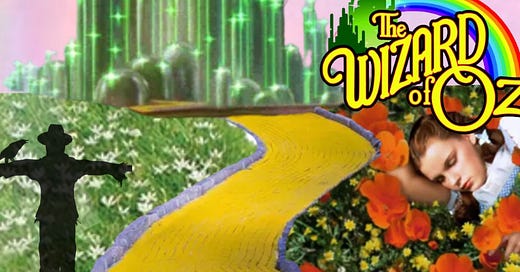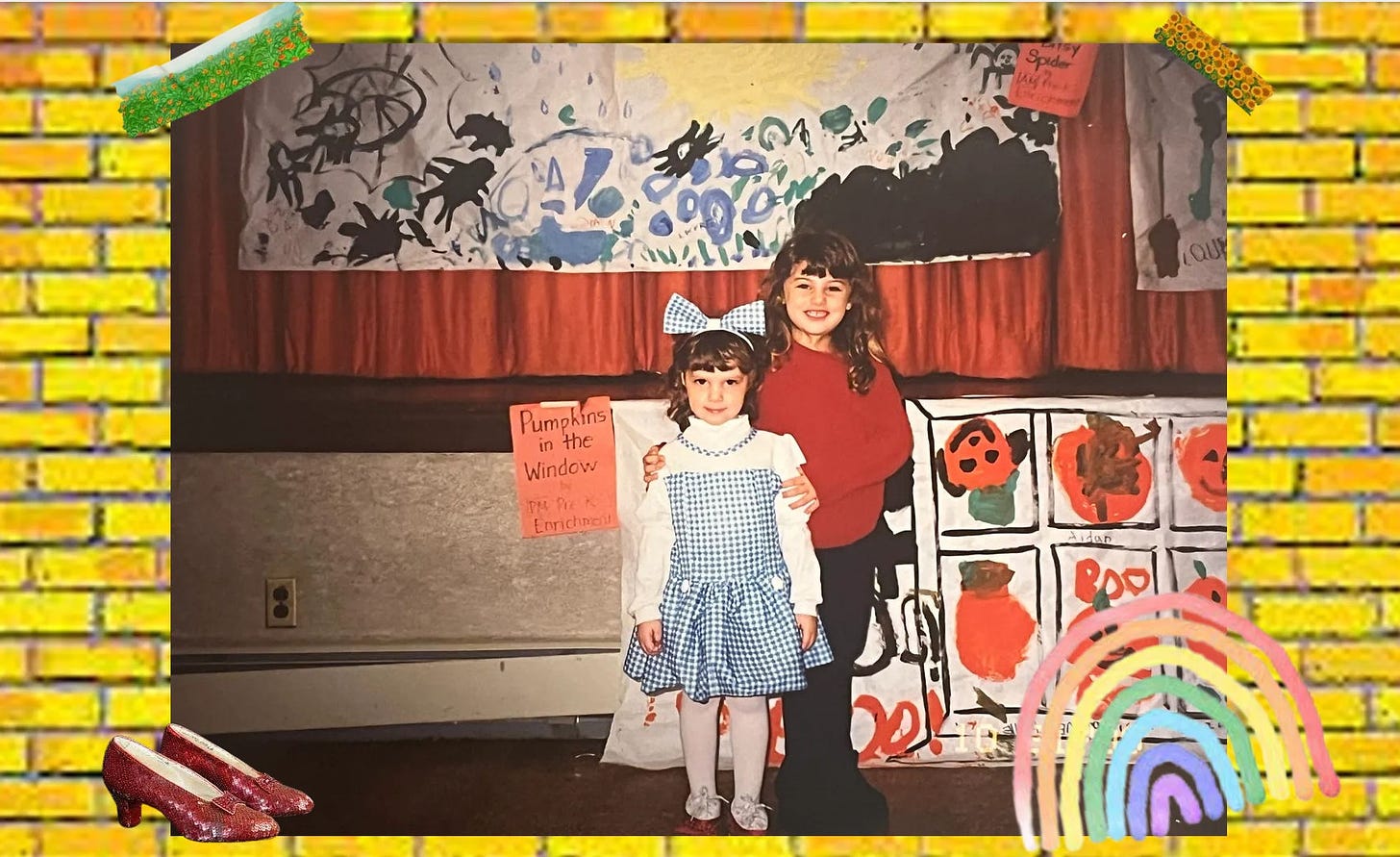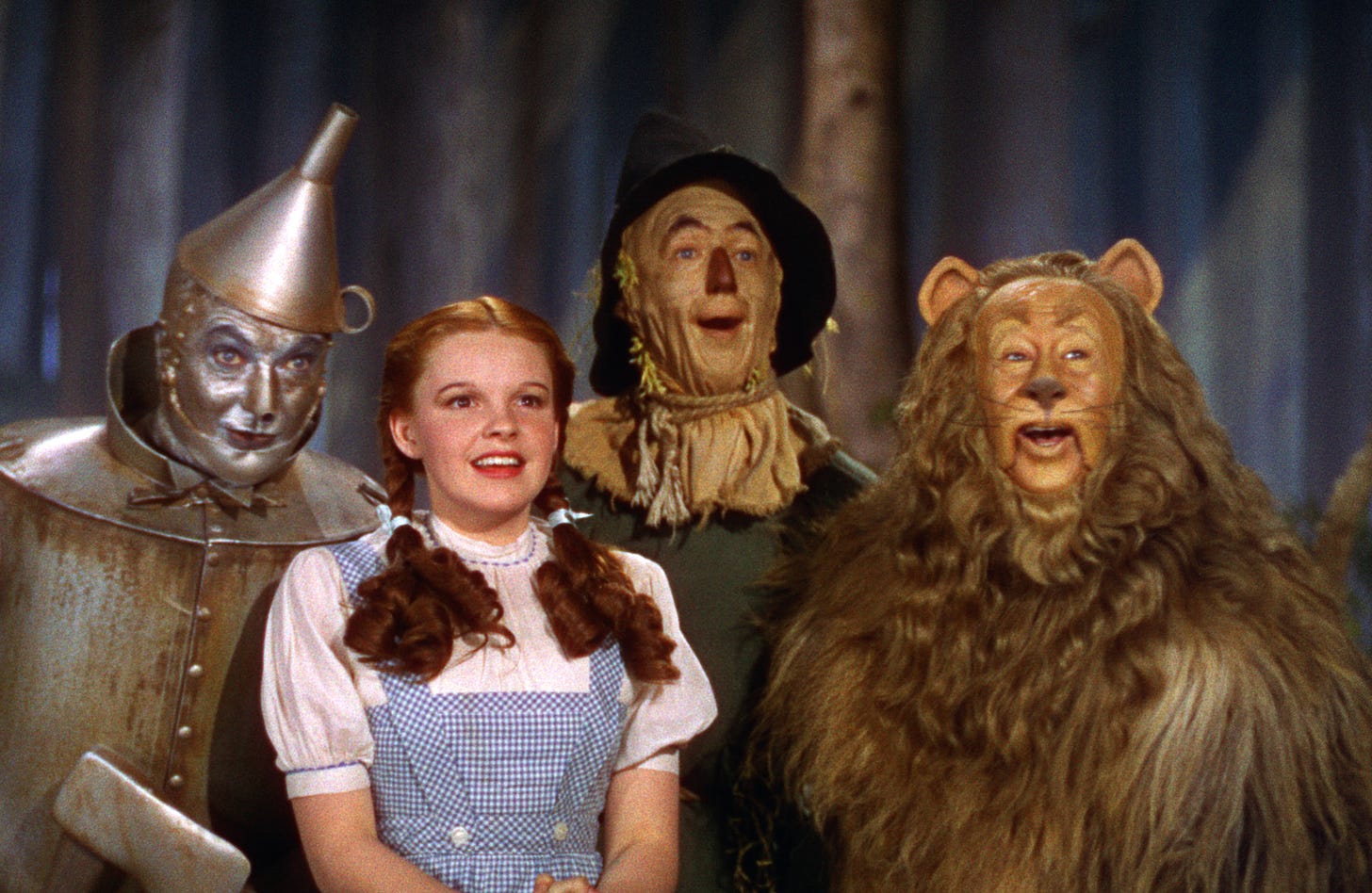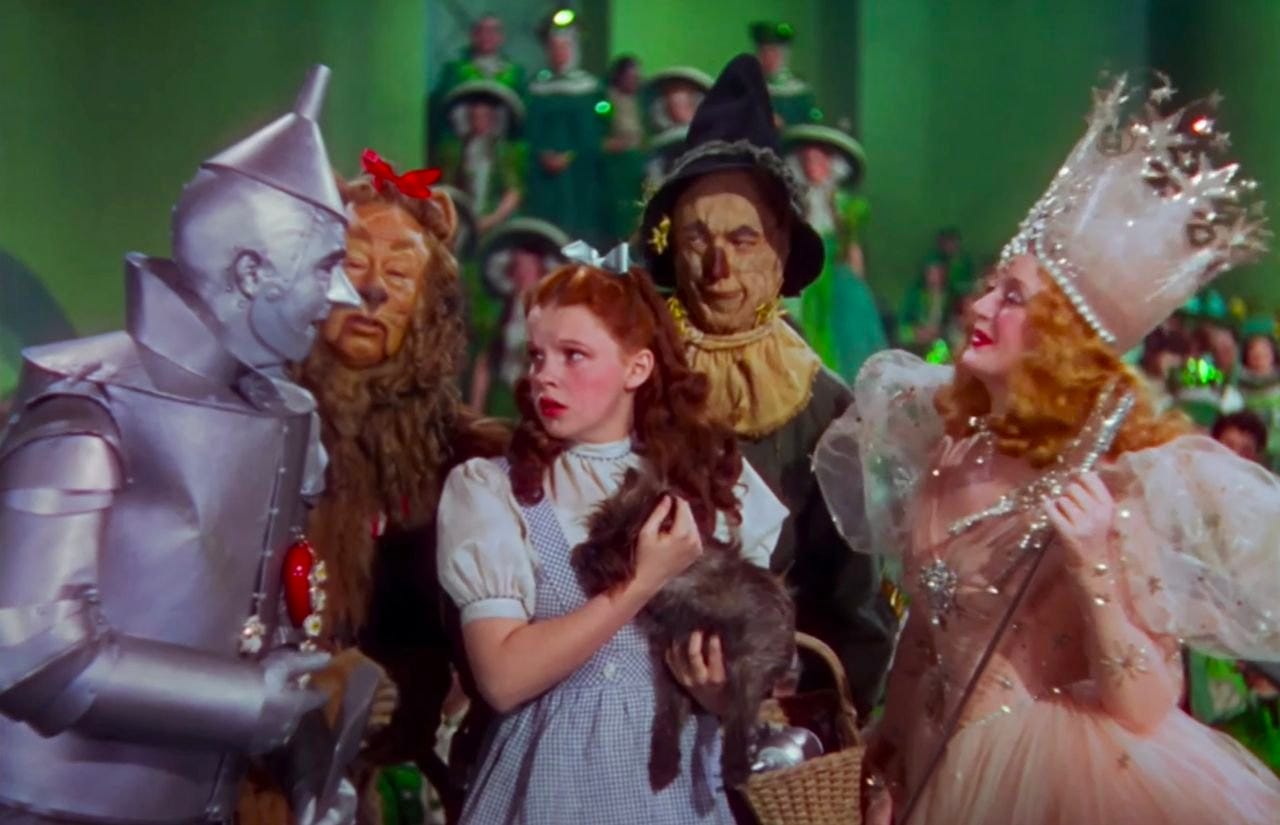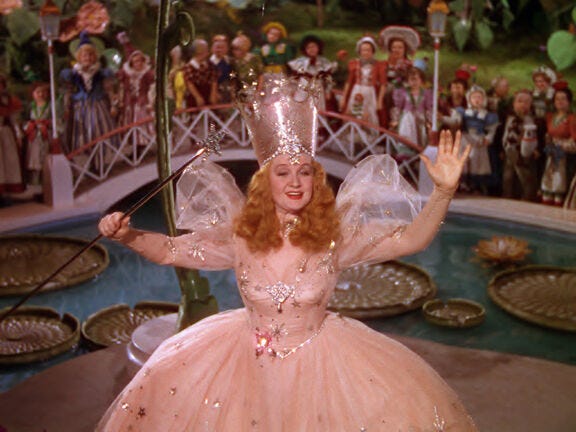Sorry for the delay again! I'm working out some scheduling issues to ensure I will get every future newsletter out on time. Regardless of the day, we've made it to Newsletter #20. This one had to be dedicated to something very special, and only one movie comes to mind when I think of my introduction to the film, leading to my passion for it, and that's The Wizard of Oz. I watched The Wizard of Oz VHS tape on a loop as a child and would dress up to reenact every scene, including switching my hair from pigtail braids to Dorothy's post-Emerald City makeover hairstyle.
When my brain takes a break from thinking about the upcoming Barbie movie, The Wizard of Oz has been at the front of my mind because the movie adaptation of Wicked is currently in production, and I am impatiently waiting for the two-part film to premiere. I've seen Wicked four times on Broadway, which shouldn't be shocking, as I mentioned that I used to watch The Wizard of Oz on loop. I'm deeply fascinated by the story, and while Dorothy only briefly appears in Wicked, she is the one I always resonated with.
As I mentioned in my The Princess Diaries newsletter, generally, we're drawn to dismissible characters thrown into unimaginable circumstances. It gives us someone to relate to but also something to strive for. Dorothy was a role model for me and so many other kids because she was the average girl next door until she was thrust into Oz, forced to face her many fears and return home as a more mature and aware person.
Early into The Wizard of Oz, Dorothy is given what, according to my last newsletter, Howard Ashman named the "want" song. This is where a character who is unhappy with their current circumstances sings about what they want for themselves. According to Ashman, this is a crucial part of a musical because it drives the story forward and informs the audience of what the character wants for themself.
In "Over the Rainbow," Dorothy sings of going somewhere else where dreams come true and all her worries disappear. Dorothy feels misunderstood by her family and the other people in her town, especially Miss Gulch, who takes Toto away from her. This isn't too different from the "want" songs in The Little Mermaid or Beauty and the Beast, where Ariel and Belle both feel like no one in their world understands them. Ashman is right that the "want" song propels the story forward and foreshadows what the main character will be after throughout the film.
Dorothy finds what she's after when she arrives in The Land of Oz, a place above the rainbow where people are more welcoming of her and Toto than they are back home. Still, despite wanting out of her small town, Dorothy's goal for the movie is to return back home. As we know, all she had to do was click the heels of her ruby red slippers to get home, but it still takes her the entire movie to figure out how easy it is to get back there. It might have been more convenient for Dorothy to have this information at the start of the film, but that would have prevented her from meeting the Scarecrow, the Tin Man, and the Cowardly Lion, who all had to go on a journey together to achieve what they wanted.
Though what I find most fascinating in The Wizard of Oz is not the friends Dorothy makes or the Wicked Witch of The West she must defeat, but the concept of Oz itself. In the book by L. Frank Baum, Dorothy really does go to a place called Oz. When she returns home, she tells Auntie Em all about her adventure, and later in the book series, Dorothy permanently moves to Oz.
However, in the Hollywood-ified film, The Wizard of Oz reveals Dorothy was only dreaming of Oz after she was knocked out from being hit with a window during the twister. Everyone in Oz was actually just someone Dorothy knew from her own life, including Miss Gulch as The Wicked Witch and Professor Marvel as The Wizard.
All the characters in Kansas share qualities with the characters in Oz, connecting the two worlds and making it more convincing that Oz was just a dream the entire time. However, not everyone from Oz exists in Dorothy's hometown, like Glinda and the munchkins from Munchkin Land. There are also several sequels to The Wizard of Oz, including 1972's Journey Back to Oz, where Liza Minelli took on the role her mother originated, and 1985's Return to Oz. Both movies suggest Oz is a real place.
From my perspective, Oz never felt like a real place, but it never quite felt like a dream, either. While the general consensus is that in the movie, Dorothy's experience was but a mere dream, I always believed it was open to interpretation. Oz could very much fall in between both real and imaginary as an alternate realm that Dorothy accesses through her imagination. This is why she could only go there while she was asleep. Suppose Oz is a more colorful and exaggerated mirror of Dorothy's Kansas hometown. In that case, it makes sense that her family and neighbors would also be there as exaggerated versions of themselves.
However, the most important takeaway from The Wizard of Oz is that whether or not the colorful land is real isn't very important after all. What's important is the journey Dorothy makes while she's there and how it changes her when she returns home. Dorothy finds intelligence, love, and courage alongside her friends in Oz, suggesting maybe they were all just a projection of what she was looking for inside herself the whole time. She only believed she had to go on a journey to find these things, just like she thought she had to travel to Emerald City so the Wizard could send her home when she had the ability within her the whole time.
This is another one of my favorite lessons from The Wizard of Oz. Everything Dorothy needed was within her, and this was seemingly true for her friends as well. All the Wizard did was give the Scarecrow a diploma, the Tin Man a clock in the shape of a heart, and the Cowardly Lion a medal. These were just placebos leading the characters to believe they'd finally received what they'd set out for when they had it in them the whole movie. They wouldn't have made it all the way to the Wizard if they didn't already have everything it takes.
“If I ever go looking for my heart’s desire again, I won’t look any further than my own backyard because if it isn't there, I never really lost it to begin with.” Dorothy Gale, The Wizard of Oz.
This is a pretty strong message about real life too. We're always in search of happiness and fulfillment outside of ourselves when everything we're searching for is already within. If we simply turned our attention from the outside world to our inner world, we'd effortlessly find everything we're in search of. This is why it only took Dorothy's belief that she could go home to send her back to Kansas. She couldn't get there when she was searching for a way back home on the outside, but when she listened to Glinda and closed her eyes, she was back home instantly.
I didn't figure this all out when I was a little kid, but I think subconsciously, even kids can pick up on the important messages in movies. Wicked tells a much different story than The Wizard of Oz, focusing on Glinda and The Wicked Witch's history as well as what turned the witch evil. Though, since the musical takes place in Oz, without Dorothy present to perceive the land, I conclude that Oz really is a real place, even if it can only be accessed through the imagination.
If you ever find yourself there, make friends with the brainless Scarecrow; he's actually a lot smarter than he thinks he is. And if you find yourself growing tired of the magical land and want to go back home, remember everything you're really seeking is within you already, and then click your ruby red slippers together, and you'll be back in Kansas in no time.

